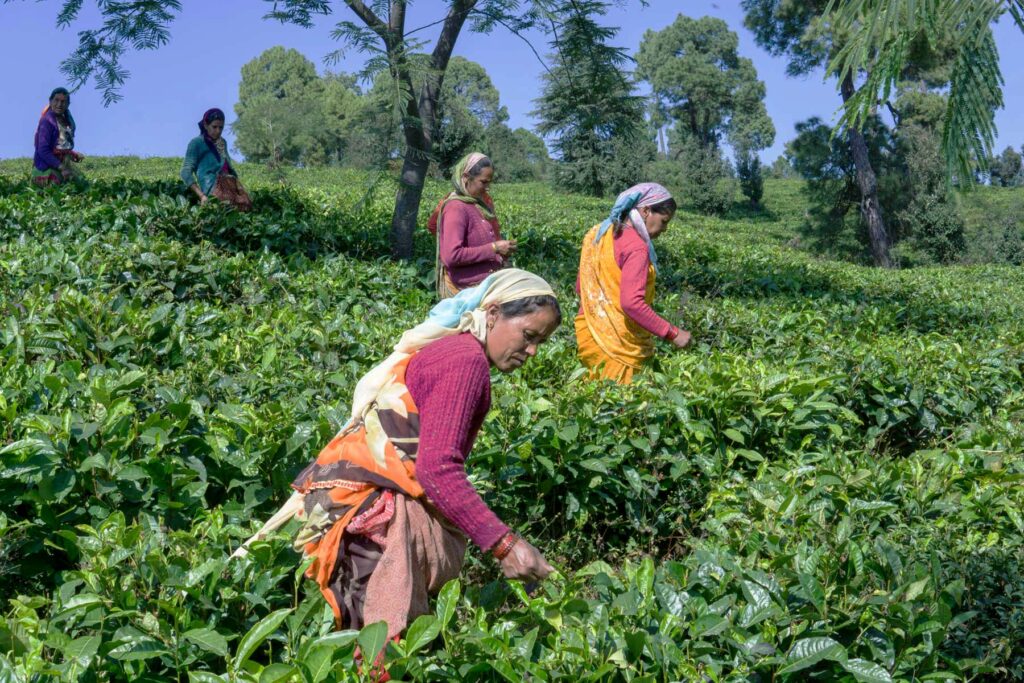Kumaon Tea reinvents the way tea gets made and sold

Acumen announces a new investment in a company whose community-ownership model empowers smallholder tea farmers across the Himalayas.
- Blog
- Agriculture
- India
Despite the global popularity of tea, tea farmers rarely profit from their profession. In India, most work on tea estates systematically excludes them from ownership. Low wages make it difficult for them to support themselves and their families, and many end up stuck in a cycle of poverty.
Enter Kumaon Tea, a subsidiary of Acumen’s new investee, Almora Global, that is pioneering a more equitable and sustainable approach for tea production. Rather than view tea farmers as mere day laborers in the system, Kumaon Tea champions a community-ownership model that gives them real skin in the game and a viable pathway out of poverty.
Kumaon Tea’s proving ground is the district of Champawat in the north Indian state of Uttarakhand. Here, high in the Himalayan mountains, the company has built a farmer-owned tea processing plant that makes high-end specialty tea for global markets, which are sold by Young Mountain Tea. The quality of the end product allows the factory to pay local workers fairly and procure tea from farmers in the region at better prices (3x commodity rates as compared to the rates factories pay in other regions). The farmers’ trust, which will have 500 local farmers as its members, currently owns 20% of Kumaon Tea and will eventually hold a controlling stake. This is the first time Indian farmers will have an ownership stake in a specialty tea company, and through the processing plant’s profits, will have a pathway to sustainable livelihoods.
“The Indian tea industry is ripe for reinvention,” says Raj Vable, the founder of Young Mountain Tea and a partner in Kumaon Tea. “By embracing a co-op model, we can share profits fairly, empower smallholder farmers, and make better tea.”
A woman-powered revolution
Like rural regions across India, Kumaon has experienced an exodus of youth as they move to urban areas in search of better-paying jobs. When Raj Vable first arrived in Kumaon in 2010, he found empty villages and once-rich farmland deteriorating into fallow fields and unstable dirt. Climate change brought longer droughts followed by unprecedented flooding, triggering deadly landslides.
The locals left to survive in this difficult environment were disproportionately women. Vable was struck by their resilience, their knowledge about farming, and their ability to create vibrant lives despite hard circumstances. Ninety percent of the farmers in Kumaon tea’s trust are women.
With the government’s support, the women began to revive old tea estates and plant new farms on abandoned land. This helps regenerate local soils to reduce landslides while also sequestering carbon from the air. Thanks to Kumaon Tea’s community-owned model which provides increased yields to the market and gives farmers the potential to earn three times as much for their crops, plus profits from the factory.
Kumaon Tea’s goal is to gradually hand over control to local farmers, enabling them not only to benefit from farming but also to directly reap the rewards of tea processing through shareholding in the factory. As a factory is being constructed by Almora’s holding company in India, this model allows farmers to capture the added value from processing, which increases their margins and economic empowerment. The aim is to replicate this successful model with other communities throughout the Kumaon region and across the Himalayas, extending to Nepal.
Why Acumen invested
Acumen is committed to supporting companies and building markets that help create safe, stable, dignified jobs for people around the world. As part of this agriculture development mandate, we’re eager to understand the scalability and replicability of Kumaon Tea’s asset ownership model.
In agriculture, the bulk of the upside is generated not from selling raw materials but from processing them. Farmers in general — and especially smallholder farmers in rural India — usually miss out on this upside. Our hope is that Kumaon Tea’s model will benefit the community equally and be replicated across the region and across other crops like coffee. In the best-case scenario, Young Mountain Tea will carve out a niche in the tea industry for Kumaon tea and the government will be inspired by Kumaon Tea’s success to provide subsidies to set up similar projects around the country.
Most of the Kumaon women involved are experiencing financial independence for the first time thanks to tea. This venture will help us develop best practices for empowering women farmers through trainings in organizing, governance, technical skills, collective money management, negotiation, and leadership.
“Kumaon Tea is building a blueprint for a replicable model of profit sharing through community ownership” says Paraag Sabhlok. “We’re excited to partner with them, support their growth, and learn from their experience.”
Image Courtesy of Kumaon Tea Farmers